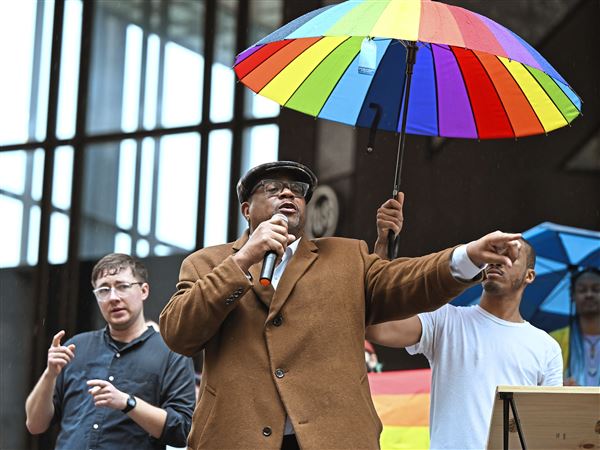It’s a debate about people.
That was the message presented at AFL-CIO President Richard Trumka’s first stop on his NAFTA Trade Tour. Mr. Trumka, a southwestern Pennsylvania native, led a town hall Monday evening at the Pittsburgh Federation of Teachers on the South Side.
Along the topics discussed Monday was what is needed from the current NAFTA negotiations to benefit working Americans.
NAFTA is an agreement between the United States, Canada and Mexico to reduce trade barriers between the three countries. In 1993, President Bill Clinton signed it into law and it went into effect January 1994.
“We need something that benefits all Americans, not just those at the very top,” Mr. Trumka said. “Something better for our working people. Something better for our economy. Something better for everyone.”
Beth Mikus, a 30-year member and employee of Service Employees International Union, asked if it might be beneficial to accept the agreement if it’s better than the original and then fix it as time goes on. Mr. Trumka responded by saying that it is not better because it’s not enforceable. He said if they can’t enforce it, it’s useless.
The current deal falls short of what American workers need, Mr. Trumka said, noting major points, such as how it lacks ways to enforce higher labor standards and includes more benefits to “Big Pharma.”
In September, the U.S., Mexico and Canada agreed to replace NAFTA. President Donald Trump and his administration have been promoting the renegotiated trade terms called USMCA — United States-Mexico-Canada Agreement. Vice President Mike Pence visited a manufacturing facility in York County earlier this month to promote the new deal.
Congress has not ratified the new trade deal due to its similarity to NAFTA.
Mr. Trumka said that the labor movement supports trade and would support NAFTA if it benefits working Americans, which is why the AFL-CIO submitted a list of more than 130 changes to NAFTA. He said AFL-CIO has been present in meetings.
“They know exactly here we stand. They know exactly what an agreement should be,” he said.
Mr. Trumka said the U.S. spends much more on immigration enforcement than on labor standards — about $24 billion on immigration and $2 billion on labor, such as working rights, pension rights and health care rights.
The 25-year-old trade deal has largely helped the average North American, but economists said that a small portion of blue-collar workers in manufacturing industries have suffered. Thirty-eight thousand jobs have been lost in Western Pennsylvania due to NAFTA, Darrin Kelly, president of the Allegheny/Fayette Central Labor Council, said.
Rick Bloomingdale, president of the Pennsylvania AFL-CIO, said that if you drive around Western Pennsylvania you can see the effects of NAFTA.
“They devastated the economy. They have devastated Western Pennsylvania,” Mr. Bloomingdale said.
Lindsey Disler, who works in the organizing department for the United Steelworkers, said as someone who was born the same year NAFTA went into effect, she and her peers have witnessed first-hand the effects of NAFTA.
“I know no other life than dealing with the ramifications and fallout of NAFTA,” she said. “Many of us watched our peers’ parents lose their jobs to having them to move down to Mexico.”
Fred Redmond, international vice president of United Steelworkers, said that NAFTA has caused the wages and benefits for workers to decrease.
“The system is not designed benefit workers in the U.S. or Mexico,” Mr. Redmond said. “It is designed to maximize corporate gains.”
Mr. Trumka said that the U.S. need to take its time and create an agreement that works.
“It’s more important to get it done right than get it done tomorrow.”
Trumka will also make stops in Ohio and Michigan on Tuesday and Wednesday.
Amanda Parrish: aparrish@post-gazette.com or 412-263-3852
First Published: June 18, 2019, 1:37 a.m.

















